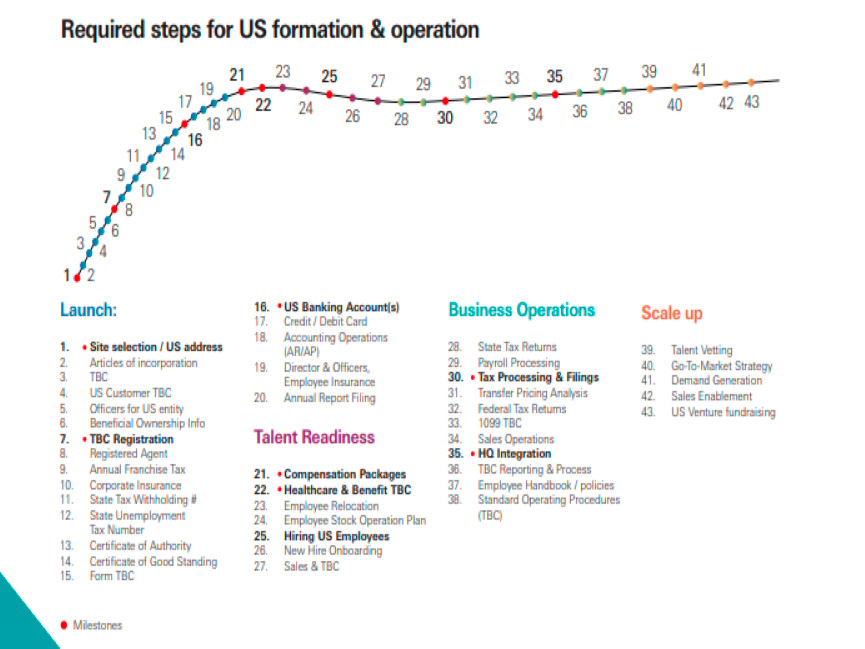4 Pillars of US expansion
- Growth
- Article
- 5 minutes read

Willie Sutton"Go where the money is… and go there often."
Although this quote comes from a notorious American bank robber, it’s a mantra that holds true for the modern founders; and if you’re a founder in tech, the money is in the US market. With some 6175 active VCs, several exciting tech hubs, and one of the world’s biggest, wealthiest customer bases, the appeal is evident.
However, successfully opening shop in the US is a challenge that as many as 70% of startups fail1.
While every business faces its own unique challenges, and there’s no silver bullet to make US expansion less complex, there are certain core principles that can help you approach the problem in a structured way.
Here are our 4 pillars of US expansion.
Founders are resilient, resourceful, and brave – traits that are essential in enduring the inevitable challenges that come with building a successful business.
Building your business in a new market will test that resolve to the limits – especially if you’ve already spent years establishing yourselves locally.
Matt Oxley, founder of Opal and Partner at US Expansion Partners, has successfully scaled to the US and subsequently returned to the UK. He is quick to stress the importance and impact of the human side of expansion as a first point of consideration.
“How can all this not impact your mental health, not to mention your ability to do your best work for the business?”.
Founders need to reflect and be honest with themselves about the reality of leaving their current business and family behind, or moving them abroad, while going through the fundraising process in a new country.
It's not to be taken lightly.
The emotional highs and lows, the exhaustion of travelling back and forth, and the complexity of navigating new networks and cultural differences make scaling into a new market particularly demanding – even for experienced founders.
However, for the most visionary founders it’s often a case of nothing ventured, nothing gained. Prepared to give it your all? Time to assess whether your business is ready to do the same.
Picture this: your business is flying. Your customer base is growing, and so is your team. You’ve got real momentum, and keep hitting your milestones.
Would you be comfortable to step away from that point and hand over the reins to your team? Delegating control of local operations, particularly if your business is close to your heart, can be challenging on a personal and practical level – particularly if you’re still reliant on founder-led sales at home.
If you’re planning on scaling to the US, you need to be in a place where your business is ready to take the strain of the founder being on a new mission, both in terms of revenue and cashflow, and operations.
“I believe that the first feet on the street need to be founder feet. If you want to go after a generational opportunity and really make it happen, you have to be ready and be prepared to give it everything.”
Matt Oxley, Partner, US Expansion Partners
At a practical level, that means travelling to and from the US frequently for as much as 18 months – another massive commitment.
These two guidelines help you to be objective about your trajectory, and can give you a sense of what it takes. If your gut says yes, take the time to complete a readiness assessment to get a clear picture of any gaps you still need to address.
If you and your business are in a position to scale to the US, it’s time to pick a team to help you get there.
There are hundreds of steps on the journey to the US – steps that are too complex and time-consuming for founders to take alone.

These challenges mean that it can be immensely valuable to seek expert advice around not only fundraising, but banking, hiring, and Legal considerations, too.
Building a specific strategy to help narrow your search for investors, and ensuring you work with a banking partner that helps you navigate the practicalities of day-to-day banking, payroll, helpful introductions and so on can help alleviate the strain of managing your money and resources across two continents.
It's also recommended to work with a local expert when it comes to building your go-to-market sales team. Unlike in the UK, there are specific state and federal rules around hiring that can feel totally alien. Work with an expert to ensure you get the best in the business to ensure you get a return on your talent investment.
Similarly, working with specialist lawyers is also a gamechanger. Avoiding costly delays can help to hit the ground running without getting caught up in red tape.
Got your dream lined up? Get ready for a marathon.
Abraham Lincoln"Give me six hours to chop down a tree and I will spend the first four sharpening the axe."
Scaling to the US calls for careful consideration and thorough planning. Although it can feel like a leap of faith, it is a process that can, and arguably should, be gradual.
Taking time speaking to other founders, attending webinars, and doing research around the market (competitors and available investors) allows you to make strategic, informed decisions.
That puts you in a position to build your local presence at the same time, meaning you can reach a place where it is both comfortable and viable to entrust the continued growth of your business to your team:
On timing, Matt says:
“… after you have some ARR (annual recurring revenue) in the UK, some semblance or identified PMF (product market fit) and, perhaps crucially, some stability within in your business – you will need to feel comfortable handing over the keys to the business while you, as the founder, go and focus on the US. This might be harder than you think!”
While you can definitely move too early, it’s never too early to start planning for the move in a systematic, structured way.
“Expanding to the United States is a vital step in the global growth trajectory of almost every venture-backed tech startup in the UK and Europe. However, it requires careful planning, execution, and understanding of the unique cultural, legal, and business environments in the US… Completing each phase in sequential order will give your company it’s best opportunity for a successful US expansion.”
David Rose, CEO and Founder, US Expansion Partners
Expanding to the US is the end goal for many tech founders, but it is a complex process and a choice that requires significant planning.
Understanding the personal commitment is the first step in assessing whether or not it’s the right moment to brave a new market. If you’ve got the conviction, make sure your business is prepared to “lose you” but not momentum: ensure you’ve got the team and cashflow to cover costs like travel and potential new hires.
If you are ready to embrace that opportunity, gather a team of experts to give you the financial, Legal and hiring advice you’ll need to build a new network of potential investors, and open your doors.
Remember, it’s a process and there’s no need to rush into your expansion strategy.
Any opinions expressed are merely opinions and not facts. All information in this document is for general informational purposes and not to be construed as professional advice or to create a professional relationship and the information is not intended as a substitute for professional advice. Nothing in this document takes into account your company’s individual circumstances. HSBC Innovation Banking does not make any representations or warranties with respect to the accuracy, applicability, fitness or completeness of this document and the material may not reflect the most current legal or regulatory developments. HSBC Innovation Banking disclaims all liability in respect to actions taken or not taken based on any or all of the contents in this document to the fullest extent permitted by law. Nothing relating to this material should be construed as a solicitation or offer, or recommendation, to acquire or dispose of any investment or to engage in any other transaction.